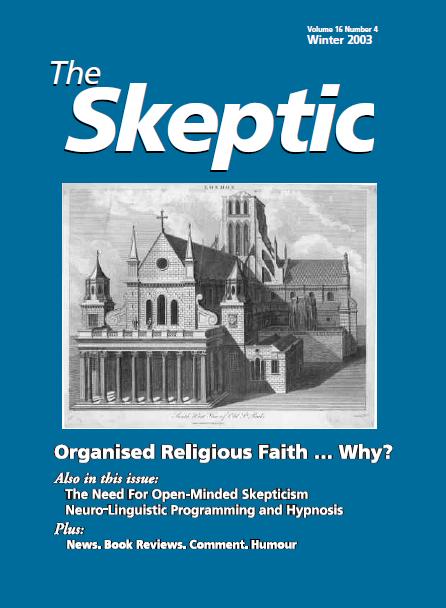Volume 16 Number 4, Winter 2003
 Features
Features
The Need For Open-Minded Scepticism
Rupert Sheldrake replies to David Marks
Power, Arcana, and Hypnobabble
Martin Parkinson reflects on the attractions of NLP
Organised Religious Faith … Why?
Douglas George tackles some of the structures and assumptions of religion
Ability to detect unseen staring
A Rael Expert
Rhyme and Reason
Steve Donnelly
To quote the broadcaster, Terry Wogan: "Is it me? or is the world just going mad?"
I am an inveterate listener to BBC Radio 4, especially the flagship Today programme. (Yes, I know Wogan's programme is on Radio 2 -- I listen to that sometimes, as well). In particular, I am always interested to hear scientific topics being addressed by John Humphrys, Sue MacGregor (now sadly retired), and the rest of the crew (despite the occasional inanity of the questions) and it is always good to hear my fellow scientists doing a good job of explaining their interests to 6 million radio listeners. And so, as the redoubtable John Humphrys introduced an item on cloning a couple of weeks ago, I was wondering which academic expert the Today programme researchers would have selected to discuss this scientifically -- and ethically -- challenging topic. Professor Steve Jones perhaps? Or that standard fallback "our science correspondant, Pallab Ghosh"? No, neither of the above -- instead the chosen expert was . . . Rael.
Who?
Parsnips and plugholes . . .
Rhyme and Reason
Steve Donnelly
I decided to make a New Year's resolution this year: to stop being weird. It all began in the fruit and vegetable section of the supermarket where I was closely examining the parsnips as I always do at this time of the year, just before my final lecture to first-year Physics undergraduates on classical mechanics. As the final topic on my lecture course, I talk about Newton's conic sections as these link the mundane with the cosmic and serve beautifully to illustrate the simplicity that often underpins the apparent complexity of the universe. What are conic sections? Well, if you take a solid cone and slice it in four different ways the edges of the different cuts form a circle, an ellipse, a parabola and a hyperbola respectively and these curves are precisely the orbits of celestial bodies -- planets, comets and others -- as they move through the heavens. Parsnips are the most conical vegetable in my supermarket and are easily sliced and so I have been using them for several years to illustrate conic sections in my lectures. All very logical and reasonable, you might say; however, that view didn't appear to be shared by the young woman in a Tesco uniform who noticed me perusing the parsnips. "Can I help you", she kindly enquired. "No it's OK", I replied. "I'm just trying to find the most conical parsnips".
We Are The Skeptics My Friend
Religious Beliefs
Rhyme and Reason
I normally avoid getting involved in discussion of religion in the context of skeptics and skepticism. The main reason for this is that I do not believe that there is necessarily any intrinsic conflict between a belief in one or more deities and a scientific approach concerned essentially with falsifiable phenomena. If someone's religious beliefs have no observable and testable consequences on the universe then, in a sense, they are of no interest to the scientist or the skeptic. Therefore, although I do not possess any myself, I do believe that it is possible to hold religious beliefs and, at the same time, to have a scientific and skeptical worldview. And, indeed, there are many people with religious beliefs that, in the main, do not contradict their rational worldview.

